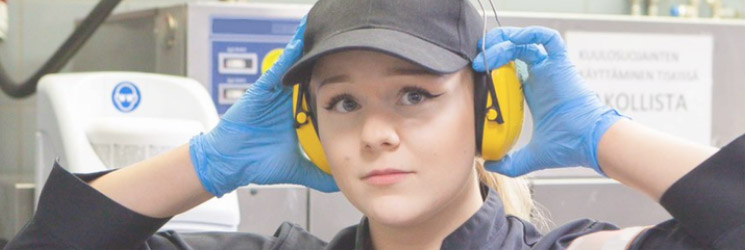

Working conditions
Night work
The Finnish Working Time Act defines night work as work carried out between the hours of 11.00 pm and 6.00 am. In the context of shift work and period-based work, night work refers to shifts of which at least three hours take place between the hours of 11.00 pm and 6.00 am. Night work can also be done regularly.
Collective agreements can lay down further restrictions or provide for a wider range of circumstances in which night work is permitted. Young people (under 18 years of age) are generally not permitted to work at night.
The risks associated with night work must be identified as part of risk assessment
Night work is both physically and psychologically draining. Night work usually requires employees to stay awake for extended periods of time and can disturb their sleep patterns. Long night shifts can increase fatigue and the risk of accidents. Night work may have several adverse health effects, such as circadian rhythm sleep-wake disorders, risk of occupational accidents, type 2 diabetes, cardiovascular diseases and cancer risk.
The ability to adapt to night work can vary considerably from one employee to another. In addition to individual characteristics, the level of strain depends on factors such as the demands of work, including having to constantly be alert, balancing work and family life and the time spent commuting.
The disadvantages associated with night work must be taken into account in risk assessment with the help of occupational health care experts. Issues to take into consideration include, among others, the number and length of consecutive night shifts and the amount of time that employees get off afterwards.
The risks associated with night work are also assessed and analysed in connection with the occupational health care provider’s workplace survey.
Ways to reduce the harmful effects of night work
Based on the results of the workplace survey, the employer must, if necessary, reduce the health risks associated with night work. The employer can, for example, reduce the amount of work performed at night, introduce shorter night shifts, reduce the number of consecutive night shifts that each employee can work, and make sure that employees have enough time to recover after a night shift. Adverse health effects associated with night work can also be mitigated by providing staff with training and guidance on healthy lifestyle habits and appropriate sleep rhythm.
Sometimes the only way to protect employees from the harmful effects of night work is to assign them to other duties that can be performed in the daytime. The switch to new duties or a different shift may be permanent or temporary depending on factors such as the employee’s condition or pregnancy. In these situations, occupational health care experts should be consulted.
Larger workplaces are often better equipped to change an employee’s working hours or duties. Employers are advised to ask their occupational health care provider’s opinion on whether an employee should be reassigned to a different role.
Monitoring of the harmful effects of night work on health
Night work can increase the risk of illness. The employer must assess the impact of night work on the health and safety of employees, taking into account the employee’s individual characteristics, health and working capacity together with the occupational health care provider.
Employees who work nights are entitled to a health examination at their employer’s expense when they first take up night work and at regular intervals determined by the occupational health care provider thereafter. Employers and occupational health care providers must work together to identify the employees at special risk of suffering ill health due to night work and their duties and who, consequently, are entitled to health examinations.
Mealtimes during night shifts
Employers have a duty to provide their employees with an opportunity to eat during long night shifts, if a break can be arranged without unreasonable difficulty. Pursuant to the Finnish Working Time Act, employees who work more than six hours in a 24-hour period are entitled to a one-hour break. A shorter break, albeit no shorter than 30 minutes, can also be agreed.
There are situations in which it is not necessary or possible to provide for meal breaks, such as in the case of temporary or quick jobs performed at night or employees with no fixed workplace.
Employers have the right to charge a reasonable fee for meals provided by them, as long as the charge does not exceed what is typical of workplace canteens.
Legislation
- Section 8 – Night work
Occupational Safety and Health Act (738/2002)
- Section 10 – Analysis and assessment of the risks at work
- Section 30 – Night work
- Section 7 – Performing a medical examination
- Section 10 – The content of advice and guidance
- Section 2 – Special risk of illness
- Section 4 – Medical examination
- Section 8 – List of examples: factors causing a special risk of illness
- Section 7 – Distribution of working hours
Government Decision on transport services for night workers (869/1996, in Finnish)

